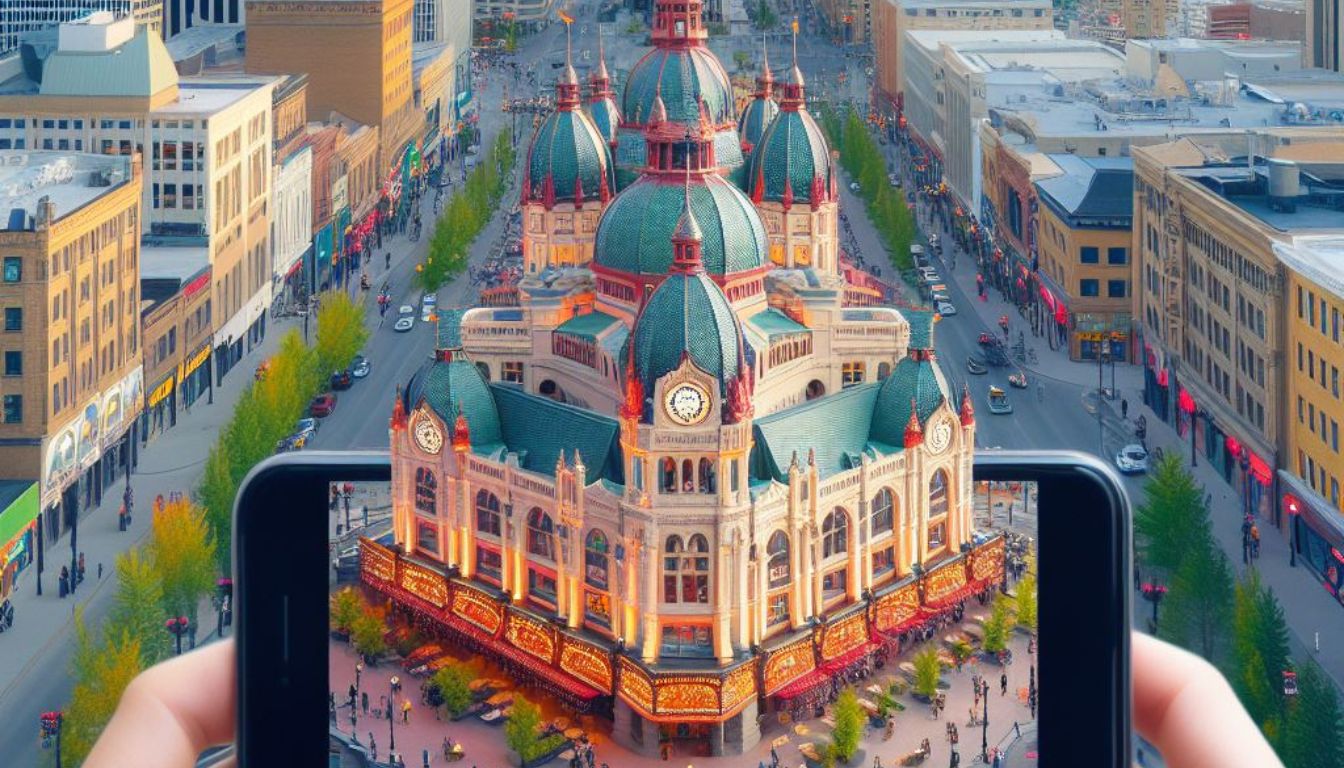How Much Does It Cost To Live In Edmonton
Key Takeaways:
- Edmonton is considered one of the most affordable cities in Canada.
- For a single person, monthly living expenses (excluding rent) amount to 800 CAD.
- For a family of four, monthly living expenses (excluding rent) amount to 3,500 CAD.
- Rent for a one-bedroom apartment in Edmonton averages 900-1200 CAD, while a three-bedroom house averages 1500-2000 CAD.
Edmonton’s affordable living costs make it an attractive city for those seeking a balance between urban amenities and affordability. From housing to transportation and entertainment, I’ll delve into the various expenses and provide tips on how to save money while living in this vibrant Canadian city.
Discover how Edmonton’s cost of living compares, helping you make informed decisions about your relocation or stay.
| Rent | Utilities | Groceries | Transportation | Entertainment | Total |
|---|---|---|---|---|---|
| $800-$1,500 | $100-$200 | $200-$300 | $100-$200 | $100-$200 | $1,300-$2,200 |
Cost of Living in Edmonton
The cost of living in Edmonton is generally affordable compared to other major Canadian cities, with housing, groceries, and transportation being relatively less expensive.
Overall, Edmonton offers a comfortable lifestyle at a reasonable cost.
Overview
Edmonton is a relatively affordable city to live in compared to other major cities in Canada.
The cost of living index in Edmonton is 90.4, which means that overall, prices for goods and services are about 9% lower than the national average.
Housing costs are particularly affordable, with the average price of a detached home being over $100,000 less than the national average.

Housing
Housing options in Edmonton range from affordable apartments to luxurious homes. The average cost of a one-bedroom apartment is around $1,000 per month, while a three-bedroom house can cost upwards of $2,000 per month.
Utilities such as electricity, water, and heating typically add an additional $150 to $250 per month to the cost of living.
Homeownership is also an option, with the average price of a single-family home being around $350,000.

Rent
Rent in Edmonton is relatively affordable compared to other major Canadian cities. The average monthly rent for a one-bedroom apartment is around $1,000, while a two-bedroom apartment typically costs around $1,200.
However, rent can vary depending on the neighborhood and the amenities offered.
For example, apartments in the city center are generally more expensive than those in the suburbs.
Utilities
Utilities in Edmonton contribute to the overall cost of living.
The average monthly cost for basic utilities, including electricity, heating, water, and internet, typically ranges from $200 to $300.
However, the actual amount can vary depending on the size of your home, usage patterns, and chosen service providers.
It’s important to factor in utility costs when budgeting for your living expenses in Edmonton.

Groceries
Groceries in Edmonton are generally affordable compared to other Canadian cities.
A family of four can expect to spend around $1,000 per month on groceries, depending on their dietary choices and shopping habits.
There are many grocery stores to choose from, including large chains like Safeway and Sobeys, as well as smaller independent grocers and ethnic markets.
Transportation
Transportation in Edmonton is a blend of convenience and affordability.
The city’s efficient public transit system, including buses, LRT, and accessible options, provides a cost-effective way to navigate the city.
Residents also enjoy a well-maintained road network and bike-friendly infrastructure, making commuting by car or bicycle a breeze.
With accessible taxis and ride-sharing services, Edmonton’s transportation options cater to diverse needs and budgets.
Public Transit
Edmonton’s public transit system, operated by Edmonton Transit Service (ETS), offers a convenient and affordable way to navigate the city. With an extensive network of bus routes, LRT lines, and accessible options, ETS provides reliable transportation across Edmonton and surrounding areas.
Monthly passes and discounted fares for students, seniors, and low-income individuals make it an economical choice for daily commuters and occasional riders alike.

Cars
Cars contribute to transportation costs in Edmonton. The cost of owning and operating a vehicle, including fuel, insurance, and maintenance, can vary depending on the type of car, fuel efficiency, and driving habits.
Public transportation is also available in Edmonton, with bus and LRT (light rail transit) systems.
The cost of public transportation can vary depending on the frequency of use and the type of pass purchased.
Gas
Gas prices in Edmonton fluctuate regularly, influenced by global oil markets, supply and demand dynamics, and local factors.
On average, gas prices in Edmonton tend to be lower than the national average, making it a relatively affordable city for drivers.
However, it’s important to note that gas prices can vary significantly depending on the specific location and time of year.
Entertainment
Edmonton offers a variety of entertainment options for residents and visitors. From world-class festivals and concerts to museums, art galleries, and theaters, there’s something for everyone.
The city is also home to several professional sports teams, including the Edmonton Oilers hockey team and the Edmonton Eskimos football team.
Dining Out
Dining out in Edmonton offers various options catering to diverse tastes and budgets. From affordable food trucks to upscale fine dining establishments, the city’s culinary scene continues to evolve.
Local ingredients and international flavors blend to create a vibrant dining experience.
Whether seeking a casual lunch spot or an unforgettable evening out, Edmonton’s restaurants promise to satisfy every palate.
Healthcare
Healthcare in Edmonton is covered by the Alberta Health Care Insurance Plan, which provides basic medical services to all residents.
The plan covers physician visits, hospital stays, and prescription drugs.
Edmontonians also have access to a variety of private healthcare providers, including dentists, optometrists, and chiropractors.
The cost of healthcare in Edmonton is generally lower than in other Canadian cities.
Childcare
Childcare costs in Edmonton vary depending on the type of care, the age of the child, and the location of the provider. On average, daycare for a toddler can cost between $1,000 and $1,500 per month, while preschool for a three- to five-year-old can range from $600 to $800 monthly.
Nannies typically charge between $15 and $25 per hour.
Education
Edmonton offers a wide range of educational opportunities, from highly ranked public schools to world-class post-secondary institutions. The University of Alberta is one of Canada’s top research universities, and the city is also home to MacEwan University and NorQuest College.
With a focus on affordability and accessibility, Edmonton provides a supportive learning environment for students of all ages.
Taxes
Taxes play a significant role in determining the cost of living in Edmonton. Residents pay various taxes, including income tax, property tax, and sales tax.
The income tax rate varies depending on the individual’s income bracket.
Property tax rates are set by the city and can vary based on the property’s location and assessed value. Additionally, a 5% Goods and Services Tax (GST) is levied on most goods and services.
These taxes can add up and impact the overall cost of living in Edmonton.
Miscellaneous Expenses
Miscellaneous expenses in Edmonton can vary depending on individual lifestyles and preferences.
Common miscellaneous costs may include entertainment, such as dining out, movies, and events; personal care items like toiletries and cosmetics; and household supplies like cleaning products and basic home maintenance items.
Additionally, costs for hobbies, fitness, and travel can also contribute to miscellaneous expenses.
Saving Money in Edmonton
House hunting? Look into the suburbs of Beaumont, Legal, or Morinville, where you’ll get more bang for your buck.
Eating at home is a surefire way to save money.
If you’re downtown, consider communal living: less space and fewer amenities, but it’s affordable.
Tips for Saving on Housing
Saving money on housing can be a daunting task, but there are several strategies you can employ to make your living situation more affordable. Consider house hacking by renting out a room or portion of your property.
Explore cohousing or shared housing arrangements to divide costs among multiple individuals.
Research government subsidies or grants that may assist with housing expenses. By implementing these tips, you can potentially reduce your housing costs and free up more of your income for other expenses or savings.
Ways to Save on Food
Saving money on food is essential for living affordably in Edmonton.
Consider buying groceries from discount stores or ethnic markets, opting for generic brands, and planning meals ahead to reduce impulse purchases and waste.
Eating out less frequently, utilizing coupons and loyalty programs, and learning to cook basic meals can also help cut down food costs significantly.
Saving on Transportation
Utilizing public transportation, cycling, or walking instead of driving can significantly reduce transportation costs in Edmonton.
Consider carpooling or ride-sharing to split fuel expenses.
Take advantage of discounted transit passes, student discounts, and loyalty programs.
Explore the city’s extensive bike lane network and walking trails to save on gas and parking.
Cutting Entertainment Costs
Cutting entertainment costs in Edmonton can be achieved through various strategies.
Consider free or low-cost alternatives like attending local festivals, exploring parks and recreational facilities, or engaging in outdoor activities like biking, hiking, or cross-country skiing.
Additionally, take advantage of discounts and promotions offered by entertainment venues and attractions.
Look for budget-friendly options like matinee movie showings, student discounts, or family passes.
Frequently Asked Questions
What is the average rent for a one-bedroom apartment in Edmonton?
The average rent for a one-bedroom apartment in Edmonton varies depending on the neighborhood and amenities offered.
As of 2023, the average rent for a one-bedroom apartment in Edmonton is approximately $1,100 per month.
However, rents can range from as low as $800 per month to as high as $1,500 per month or more.
It’s important to research and compare rental rates in different areas to find an apartment that fits your budget and needs.
How much does it cost to own a car in Edmonton?
The cost of owning a car in Edmonton can vary widely depending on factors such as the type of vehicle, insurance rates, gas prices, and maintenance costs. On average, Edmonton residents can expect to pay around $9,000 per year for car ownership, including insurance, gas, repairs, and depreciation.
What is the average cost of groceries in Edmonton?
The average cost of groceries in Edmonton varies depending on the type of food and where it is purchased.
A study by the University of Alberta found that the average monthly grocery bill for a family of four was $800 in 2019.
This cost can be lower if you shop at discount stores or buy generic brands.
Eating out at restaurants is generally more expensive than cooking at home.
How much does public transit cost in Edmonton?
Public transportation in Edmonton is affordable and convenient.
A single adult fare costs $3.25, while a day pass costs $10.
Seniors and students can purchase discounted fares.
The Edmonton Transit System also offers a variety of fare options for families and groups.
What are the average childcare costs in Edmonton?
The average cost of childcare in Edmonton varies depending on the type of care, age of the child, and the specific provider.
On average, families can expect to pay between $1,000 and $2,000 per month for full-time childcare.
This includes costs for daycare, preschool, nannies, and babysitters.
Final Verdict
Edmonton offers an affordable and comfortable lifestyle compared to many other major Canadian cities. Housing, transportation, and entertainment costs are generally lower, while the city boasts a diverse culinary scene, numerous green spaces, and ample opportunities for outdoor recreation.
Whether you’re a young professional, a family, or a retiree, Edmonton provides a welcoming and cost-effective place to call home.







